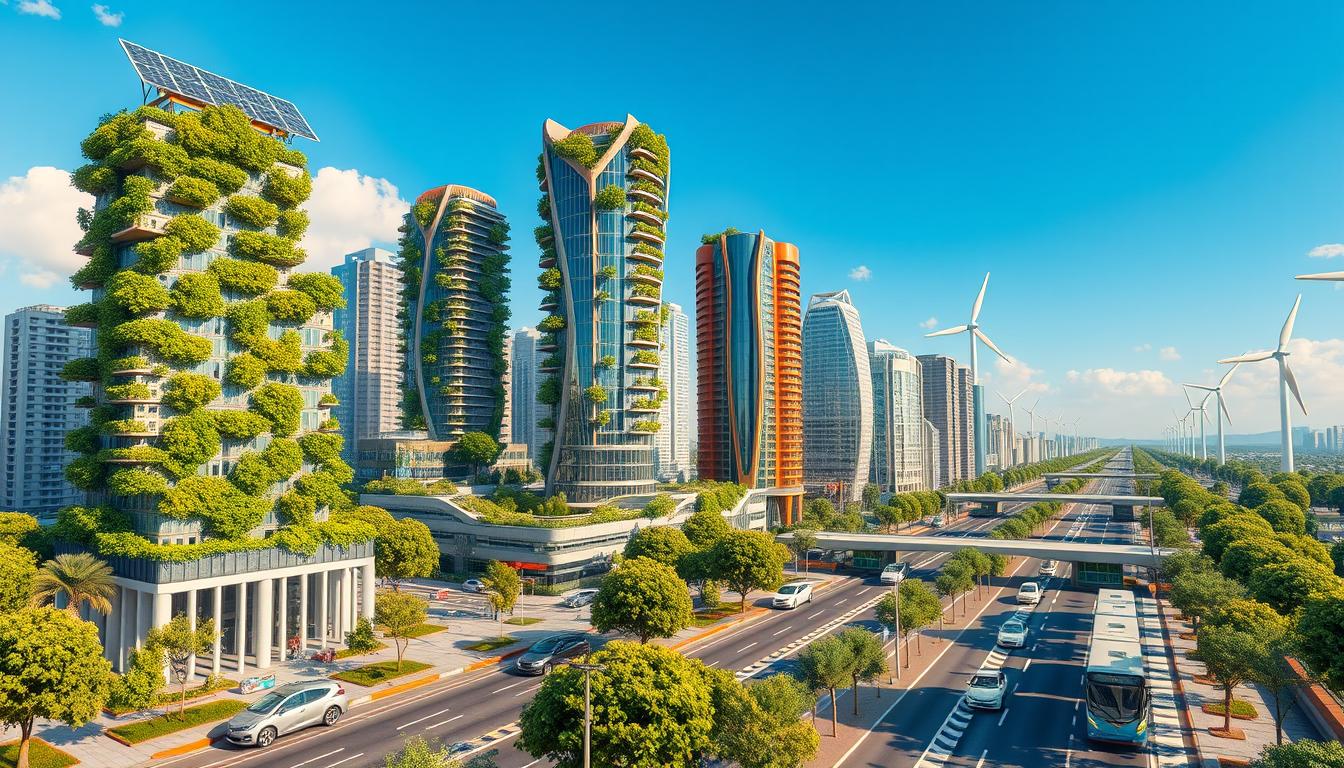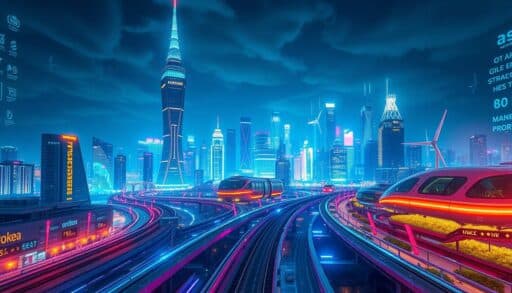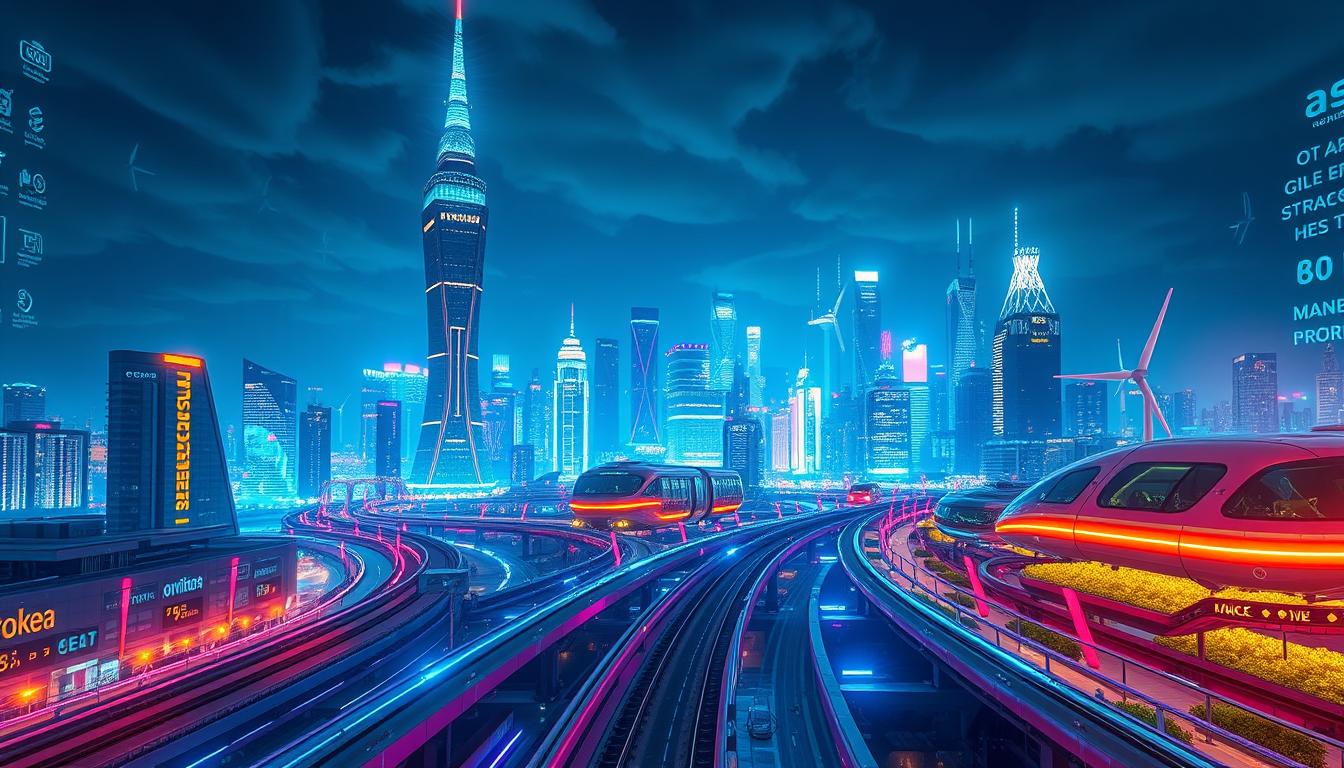Technology is changing fast, leading to quicker progress and more innovation. For those looking for top jobs, keeping up with new tech trends is key. The future will see big changes with AI, quantum computing, 5G, and more.
These new technologies will change how we work and live. They will make things more efficient and open up new possibilities. By getting into these areas, you can lead the digital charge and find exciting career paths.
Key Takeaways
- Emerging technologies like AI, quantum computing, 5G, and XR are shaping the future across industries.
- These technologies promise to transform productivity, enable new applications, and expand access to innovative solutions.
- Staying informed about the latest technology trends is crucial for professionals seeking high-paying and promising jobs of the future.
- The World Economic Forum’s annual report highlights the top 10 emerging technologies that are expected to attract significant investments and achieve considerable scale within the next five years.
- Understanding and embracing these emerging technologies can help professionals position themselves at the forefront of the digital revolution.
Artificial Intelligence: The Driving Force
Artificial intelligence is leading the way in many new technologies. Generative AI for language is changing how we interact with technology. It makes talking to machines feel more natural. Generative AI for visual content is also changing the game for creative fields. It can make images and videos from different inputs.
The growth of AI agents is exciting. These advanced systems use language models to do complex tasks. They can make decisions and work on their own. AI agents are speeding up software development and improving edge intelligence and autonomous mobility technology. They also make extended reality experiences better.
Generative AI for Language
Conversational AI, powered by language models, is changing how we talk to technology. Chatbots and virtual assistants can now talk like humans. They offer personalized help and automate many tasks.
Generative AI for Visual Content
Advances in computer vision and deep learning have made generative AI create amazing content. It can make realistic images and videos. These tools are changing the creative world, helping both pros and hobbyists.
AI Agents and Autonomous Systems
AI agents, built on advanced language models, can do complex tasks on their own. They make decisions and talk to users for companies or people. These AI systems are making software development faster. They’re also improving autonomous vehicles and other smart devices. Plus, they’re enhancing extended reality experiences.
“The advancements in AI have democratized AI research and applications, enabling more individuals and organizations to harness the power of this transformative technology.”
The Quantum Leap: Quantum Computing and Security

The world of computing is on the verge of a big change, thanks to quantum technology. Quantum computing uses quantum mechanics to do things we can’t do now. It promises to change many fields, from security to science, with its incredible power.
Quantum Computing: Exponential Processing Power
Quantum computers are different from regular computers. They can handle lots of data at once. This helps scientists, like those working on climate models and finding new medicines, work faster and better.
But, quantum computers can also break some of our current encryption. This has led to the creation of new, safer ways to protect our data. These new methods help keep our information safe from these powerful computers.
Quantum Security: Safeguarding the Future
As quantum tech gets better, we need stronger cybersecurity more than ever. Quantum cryptography is a way to make codes that can’t be broken. It’s a key to keeping our data safe from future threats.
Adding quantum tech to artificial intelligence and IoT security will change how we work. It will help solve big problems faster and more accurately. This is a big deal for governments and businesses.
Nations and companies are racing to be the first to use quantum tech. It’s important for them to start trying it out now. This way, they can see how it works and stay ahead.
Emerging Technologies at the Edge

The digital world is changing fast, and edge computing and edge intelligence are key players. These new technologies change how we process and analyze data. They make IoT devices and smart sensors work better and safer.
Edge Computing and Edge Intelligence
Edge computing is different from cloud computing. It brings computing power closer to where data is made. This means faster and more efficient processing, which is great for things like self-driving cars and smart homes.
Edge intelligence adds even more power to edge devices. It uses language models and AI agents for better communication and smarter decisions.
IoT Security: Securing the Connected World
More smart devices and sensor technology means we need to keep the IoT safe. New tech like zero-trust architecture and cybersecurity AI helps a lot. They protect our data and keep us safe from cyber threats.
“The convergence of edge computing, IoT, and AI is driving a new era of intelligent, decentralized systems that can process data and make decisions closer to the source, reducing latency and improving overall system efficiency.”
Using edge computing, edge intelligence, and IoT security opens up new tech possibilities. It boosts efficiency, keeps data safe, and makes quick decisions possible.
The Immersive Reality: Extended Reality (XR)

The world of technology is changing fast, especially in extended reality (XR). XR includes virtual reality (VR), augmented reality (AR), and mixed reality (MR). These technologies offer more immersive and realistic experiences. They are changing many industries and how we interact with digital worlds.
In gaming, VR has changed the game. It lets players dive into virtual worlds. With better displays and controls, VR games are getting more popular and fun. VR is also improving training in businesses, making it safer and more effective.
AR is changing retail by letting customers see products in real life. It helps them imagine furniture in their homes or shoes on their feet. As AR gets better, it will work with voice commands, gestures, and eye tracking, making shopping even better.
XR is getting better with new ways to interact, like voice commands and eye tracking. These improvements will make digital experiences more fun and useful. They will also help in training and customer service.
“The potential of XR technologies to transform various industries is truly remarkable. As they become more accessible and user-friendly, we can expect to see a surge in their adoption, leading to more immersive and engaging experiences for both consumers and businesses.”
In conclusion, XR is changing how we see the digital world. From VR games to AR shopping, these technologies are opening new doors. As XR grows, it will get even better, making our digital lives more fun and interactive.
Emerging Technologies for a Sustainable Future

The world faces big challenges like climate change. New technologies are coming up with creative solutions for a better future. These include ways to fight climate change and improve how we use resources.
Climate Change Mitigation Technology
New ways to fight climate change are being developed fast. We’re seeing more use of solar, wind, and water power. These are cleaner and more available than before.
Also, electric cars and advanced biofuels are cutting down on fossil fuel use. Systems to capture and store carbon are taking greenhouse gases out of the air. This helps lessen the effects of climate change.
Biotechnology and Bioengineering
Biotechnology and bioengineering are making big steps towards a greener world. CRISPR gene editing is changing farming by making crops better and more resilient. This boosts food production and makes farming less harmful to the environment.
These fields are also leading to new medicines and lab-grown food. This helps make our future more sustainable.
| Technology | Impact |
|---|---|
| Artificial Intelligence in Agriculture | Optimizes crop yields and water usage, impacting approximately 60% of farmers. |
| Internet of Things (IoT) in Smart Cities | Reduces environmental impact by up to 40% through traffic and pollution monitoring. |
| Circular Economy Solutions like 3D Printing | Reduces raw material usage by 30% in manufacturing processes. |
| Blockchain Technology for Supply Chain Transparency | Ensures fair labor practices and sustainable material sourcing with over 80% transparency. |
| Precision Agriculture Technologies | Decrease labor needs by 50% and minimize chemical use by 25%. |
As we face climate change and sustainability challenges, new tech offers hope. It promises a future that’s greener and more resilient. By using innovation, we can make a big difference towards a better world.
Also Read : What Skills Are Essential For Careers In Industrial Technology?
Conclusion: Embracing the Future
The digital world is changing fast, and it’s key for everyone to keep up. New tech like AI and quantum computing is changing how we work and live. Biotechnology and extended reality are also opening up new ways to innovate and grow.
By investing in learning and new tech, we can stay ahead. Knowing about the latest tech and learning new skills helps us lead and innovate. This way, we can make our work better, more efficient, and help the planet.
Adopting new tech is not just smart; it’s essential today. It lets us explore new chances, create value, and succeed in a fast-changing world. By embracing these changes, we can thrive in a global market that’s always moving.
FAQs
Q: What are some examples of emerging technologies that are expected to gain prominence in 2024?
A: Some examples of emerging technologies expected to gain prominence in 2024 include blockchain, robotics, the Internet of Things (IoT), augmented reality (AR), and neuromorphic computing. These technologies are poised to revolutionize various sectors by fostering innovation and enhancing customer experience.
Q: How does blockchain technology contribute to the evolution of emerging tech?
A: Blockchain technology contributes to the evolution of emerging tech by providing a secure and transparent way to store and share data. Its ability to create trust in digital transactions fosters innovation across industries, making it an essential part of the future technological landscape.
Q: In what ways does robotics play a role in creating new products and services?
A: Robotics plays a crucial role in creating new products and services by automating processes, enhancing precision in manufacturing, and enabling the development of autonomous vehicles. This technology allows for increased efficiency and reduced costs, which can provide a competitive advantage in various sectors.
Q: What impact does virtual reality (VR) have on sectors like gaming and education?
A: Virtual reality (VR) has a significant impact on sectors like gaming and education by providing immersive experiences that enhance engagement and learning. In education, VR can simulate real-world scenarios, while in gaming, it offers players a fully interactive environment, expanding the possibilities of entertainment.
Q: How is the Internet of Things (IoT) shaping smart cities?
A: The Internet of Things (IoT) is shaping smart cities by connecting various devices and systems to optimize urban living. This technology enables data processing from sensors to improve traffic management, enhance public safety, and foster sustainable practices, ultimately creating more efficient and livable urban environments.
Q: What is neuromorphic computing and how does it differ from traditional computing?
A: Neuromorphic computing is a type of computing that mimics the way the human brain processes information using algorithms designed to simulate neural networks. It differs from traditional computing by being more efficient in tasks that involve pattern recognition and learning, making it suitable for applications in artificial intelligence and machine learning.
Q: Can you explain how augmented reality (AR) is transforming customer experiences?
A: Augmented reality (AR) is transforming customer experiences by overlaying digital information onto the real world, allowing for interactive and engaging shopping experiences. For example, AR applications enable customers to visualize products in their own space before purchasing, enhancing decision-making and satisfaction.
Q: What are some disruptive technologies that are currently under development?
A: Some disruptive technologies currently under development include quantum computing, advanced machine learning algorithms, and nanotechnology. These technologies have the potential to change the landscape of industries by providing innovative solutions and significantly improving data processing capabilities.
Q: How does 5G technology influence the future of emerging tech?
A: 5G technology influences the future of emerging tech by providing faster and more reliable internet connectivity, which is essential for the functionality of applications like autonomous vehicles, smart cities, and IoT devices. This fifth generation of mobile technology enables real-time data processing and communication, fostering innovation and efficiency.


